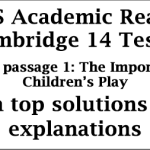Children’s play is an essential aspect of development that goes beyond mere entertainment. It encompasses physical, cognitive, social, and emotional growth, each of which is vital for a child’s overall well-being.
Physical Development: Active play, such as running, jumping, and climbing, is crucial for developing motor skills and overall physical health. These activities enhance children’s strength, coordination, and endurance. Moreover, active play helps combat childhood obesity, promoting a lifelong habit of physical fitness.
Cognitive Development: Play stimulates cognitive growth by encouraging problem-solving, creativity, and intellectual exploration. Games with rules enhance critical thinking and decision-making skills, while imaginative play fosters creativity and flexibility in thinking. Activities like puzzles and building blocks improve spatial reasoning and logical thinking.
Social Development: Play is fundamental for social skills, including cooperation, negotiation, and conflict resolution. When children play together, they communicate, share, and take turns, which helps them develop empathy and understand others’ perspectives. These interactions are essential for building friendships and learning to function within a community.
Emotional Development: Play offers a safe space for children to express and manage their emotions. It allows them to explore feelings such as joy, frustration, anger, and fear in a controlled setting. Role-playing and imaginative play help children understand and cope with different emotions, fostering emotional intelligence and resilience.
The Role of Adults: Adults significantly influence the quality of children’s play. By providing safe environments, appropriate toys, and encouraging various play activities, parents and educators can enhance the benefits of play. While children should have the freedom to direct their own play, adult involvement can enrich their experiences through guidance and support.
In conclusion, children’s play is a fundamental aspect of development, supporting physical, cognitive, social, and emotional growth. Recognizing and fostering the diverse benefits of play ensures that children develop into healthy, well-adjusted individuals.
Questions
Questions 1-5: Complete the sentences below. Choose NO MORE THAN TWO WORDS from the passage for each answer.
- Active play is essential for developing motor skills and overall ________.
- Games with rules enhance children’s ________ and decision-making skills.
- Imaginative play fosters ________ and flexibility in thinking.
- Play is fundamental for developing social skills like cooperation and ________.
- Role-playing helps children understand and cope with different ________.
Questions 6-9: True/False/Not Given
- Active play is not important for combating childhood obesity.
- Puzzles and building blocks improve spatial reasoning.
- Play helps children build friendships and learn to function within a community.
- Adults should not be involved in children’s play at all.
Questions 10-13: Matching Information
Match the following aspects of development (A-D) with the statements below.
A. Physical Development B. Cognitive Development C. Social Development D. Emotional Development
- Encourages problem-solving and creativity
- Enhances strength and coordination
- Helps express and manage feelings
- Develops empathy and understanding of others
Answers
- physical health
- critical thinking
- creativity
- negotiation
- emotions
- False
- True
- True
- False
- B (Cognitive Development)
- A (Physical Development)
- D (Emotional Development)
- C (Social Development)
How to Write This in an Exam
- Identify the Key Points: Break down the topic into key areas. For children’s play, these include physical, cognitive, social, and emotional development.
- Structure the Passage: Organize the passage into clear paragraphs, each focusing on a specific aspect of development.
- Use Clear and Concise Language: Ensure the passage is easy to read and understand. Use short sentences and avoid overly complex vocabulary.
- Include Various Question Types: Create questions that test different reading skills, such as sentence completion, true/false/not given, and matching information.
- Ensure Coherence and Cohesion: Make sure the passage flows logically from one paragraph to the next. Use transition words and phrases to maintain coherence.
- Provide Clear Answers: Make sure the answers are easily identifiable in the passage and match the question types provided.
Latest Posts
- Step-by-step guide to download and apply for jee mains admit card 202
- Comprehensive 2025 government holidays and recruitment details for job seekers
- JEE Mains Admit Card 2025: Your Step-by-Step Guide to Downloading the Hall Ticket
- Everything You Need to Know About 2025 Government Holidays Recruitment
- Comprehensive Guide to rrb d group recruitment 2025 – Eligibility, Vacancies, and Application
- Detailed guide to nps trust recruitment 2025 vacancies, eligibility and apply process
- Comprehensive guide to hpcl recruitment 2025 notification, vacancies, and application process
- ignou bed admission 2025 complete recruitment guide with eligibility and process
- Comprehensive Guide to Indian Army Agniveer Recruitment 2025 Notification and Jobs
- Everything You Must Know About CBSE Board Exams 2025 Changes & New Rules





